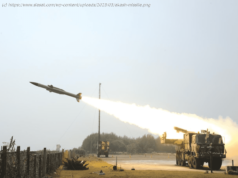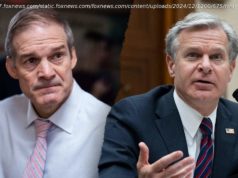The Trump Administration is set to move the US embassy in Israel to Jerusalem Monday, formally breaking from decades of established American policy and international practice in a move that US officials say will create greater regional stability.
Bruce Riedel, a former CIA officer who now directs the Intelligence Project at the Brookings Institution, said that with tensions between Iran and Israel escalating in Syria, President Donald Trump is now “only a few days away from throwing another can of gasoline on the fire by moving the embassy to Jerusalem. It’s very dangerous.”
A campaign promise
Trump announced the decision to move the embassy in December, when he formally recognized the city as the capital of Jerusalem. It marked the fulfillment of a campaign promise he made to the pro-Israel group American Israel Public Affairs Committee.
“As the President stated on December 6,2017, the historic opening of our embassy recognizes the reality that Jerusalem is the capital of Israel and the seat of its government,” the State Department said in a statement.
The Embassy move is contentious for Palestinians, who hope to claim part of the city as their future capital, and for many in the Arab world, as it is home to some of the holiest sites in Islam. The city is also home to deeply holy sites for Jews and Christians. The issue has been so thorny that international negotiators had left the question of Jerusalem to the final stages of any peace deal.
In 1995, Congress passed a law requiring America to move its embassy from Tel Aviv to Jerusalem, but every president since then has declined to make the move, citing national security interests.
The State Department noted that the opening will take place on the 70th anniversary of American recognition of the State of Israel, the day of its founding and a day that Palestinians refer to as “the Catastrophe,” as hundreds of thousands fled their homes.
Friedman is set to preside over the dedication ceremony. He’ll be backed by a delegation that includes Deputy Secretary of State John Sullivan, Secretary of Treasury Steven Mnuchin, Senior adviser and Trump son-in-law Jared Kushner, senior adviser and first daughter Ivanka Trump, and Special Representative for International Negotiations Jason Greenblatt.
US officials say the move represents the long standing reality that Jerusalem is Israel’s capital.
It also reflects a new Middle East reality, where ongoing wars in Syria and Iraq, and conflict in Yemen are uniting Israeli, American and Gulf Arabs around a central geopolitical focus: containing and constraining Iran.
In this scenario, the age-old tensions over the Israeli-Palestinian conflict are fading, Trump administration officials say, and the embassy move is no longer the flashpoint it might have been. Instead, they argue it can become grounds for more realistic talks and ultimately a settlement.
A “sea change has been coming over a period of years,” said Victoria Coates, senior director for Strategic Assessment at the National Security Council, speaking of the closeness between Gulf countries and Israel.
She pointed to a tweet from the foreign minister of Bahrain saying that Israel has a right to defend itself in the face of Iranian missiles. “I think it shows you that the President is absolutely doing the right thing here,” Coates said of the embassy move. “It is not upsetting any regional balance; in fact, his leadership is what’s bringing the region together.”
Leadership versus the people
But Diana Buttu, a Ramallah-based analyst and former advisor to Palestinian President Mahmoud Abbas, said the US might be making a mistake and conflating the region’s leadership with its streets.
“I think the leadership is different from the people,” Buttu said, speaking to CNN from Ramallah. “On a people level, the support is there because it’s a just cause.”
“The question is not what the regional reaction is, it is what is legal and what is right,” Buttu said. The embassy move, Buttu said, was “making it worse because it’s going to embolden the extreme right in Israel.” She said the move also rewarded Israel for gains it made with the military.
Trump is “sending a message that its ok to acquire territory by force,” Buttu said, calling that a “very dangerous message in this region.”
In making what officials describe as a deliberate 180-degree policy shift from the previous administration, the Trump White House believes that by making the embassy move, they’re empowering Israel to deal from a position of strength, make concessions and create peace.
Asked if Israel had offered any concessions in return for gaining the long-held goal of US recognition of Jerusalem, Friedman said there was “no give and take with Israel with regard to this decision.”
“The Israelis are obviously desirous of this, and they’ve requested this, and they’re very happy by it,” Friedman said. “But the decision was made because it was viewed to be in the best interests of the United States and something the President had promised during the campaign .”
US officials say that they remain committed to helping forge a lasting Israeli-Palestinian peace. In its statement on the embassy move, the State Department said, “we are not taking a position on final status issues, including the specific boundaries of Israeli sovereignty in Jerusalem, nor on the resolution of contested borders.”
But Aaron David Miller, a vice president at the Wilson Center, former Mideast negotiator for Democratic and Republican administrations, and CNN contributor, says that, “it’s hard to accept this argument.”
“Far from taking it off the table, Jerusalem – the most volatile issue in the negotiations — is now front and center at a time when neither of the parties are willing or able to deal with it,” Miller wrote for CNN . “If and when the Trump peace plan is put on the table, the focal point will be what it says about Jerusalem.”
And unless that peace plan reflects established language that reflects Palestinian aspirations, “including statehood with East Jerusalem as the Palestinian capital,” Miller wrote, “it’s hard to see the Jerusalem issue as anything but a continuing source of political impasse in negotiations.






